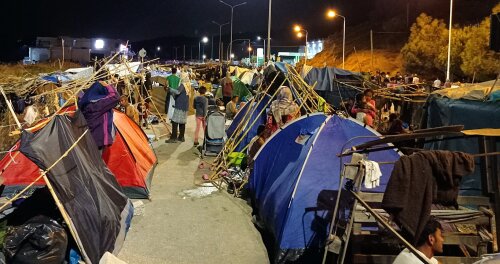Discussing decolonial and affective geographies of people on the move

Makeshift settlement of people who escaped the burning camp of Moria in Lesvos Island, (September 2020)
7 May 2024, 9:30 - 12:30
UAntwerp, Room R.A.001 (Annex)
Dr Haris (Charalampos) Tsavdaroglou, USI visiting scholar
In collaboration with MIGLOBA
This PhD workshop embraces the argument expressed by Papadopoulos et al. (2008, 56) that ‘escape comes first’, and that when people are moving ‘they leave the stage of forced immobility’ (Papadopoulos et al. 2008, 56) while ‘power reorganises itself in order to respond to their escape’ (Papadopoulos et al. 2008, 56). Indeed, it could be said that migrants, displaced persons and people on the move are constantly carrying out acts of escape. Escape from war zones in the countries of origin, escape from state-run camps, escape from bureaucratic obstacles, escape from xenophobic attacks; a wide range of acts of escape take place every day at the borders of the territory but also within the countries of arrival. For this reason, states and supranational unions such as the E.U. constantly build fences, hot spots, deportation centers, carry out push backs (Border Violence Monitoring Network 2020) and produce a multifaceted labyrinth (Tsitselikis 2019) of bureaucratic procedures for asylum applications in order to block, trap, and discourage newcomers to continue their journey. However, people on the move constantly aim to ‘circumvent state controls’ (Mainwaring 2016, 289) and ‘challenge the archipelagos of enclosures’ (Moll 2023, 585), people escape and claim the right to move. However, the crucial question remains: what are the social relationships between people escaping and which make the escape possible?
This workshop will focus on decolonial and affective geographies of people on the move in order to address the abovementioned question. The main argument is that through the concept of escape commons, we can think of escape as having a double contribution; on the one hand it aims to highlight the importance of commoning practices as a way of catalyzing acts of escape, and to demonstrate the possibility that escaping itself constitutes a collective act, which activates inventive new practices of commoning.
Program
9:30 - 9:40 Introduction (10 min)
9:30 - 10:20 Lecture (50 min)
10:20 - 10:40 Q&A (20 min)
10:40 - 10:55 Break (15 min)
10:55 - 11:25 Individual vignette writing exercise on their topics (30 min)
11:25 - 12:00 Vignettes discussion in groups of 3-4 persons (35 min)
12:00 - 12:30 Plenary discussion (30 min)
12:30 - 14:00 Lunch